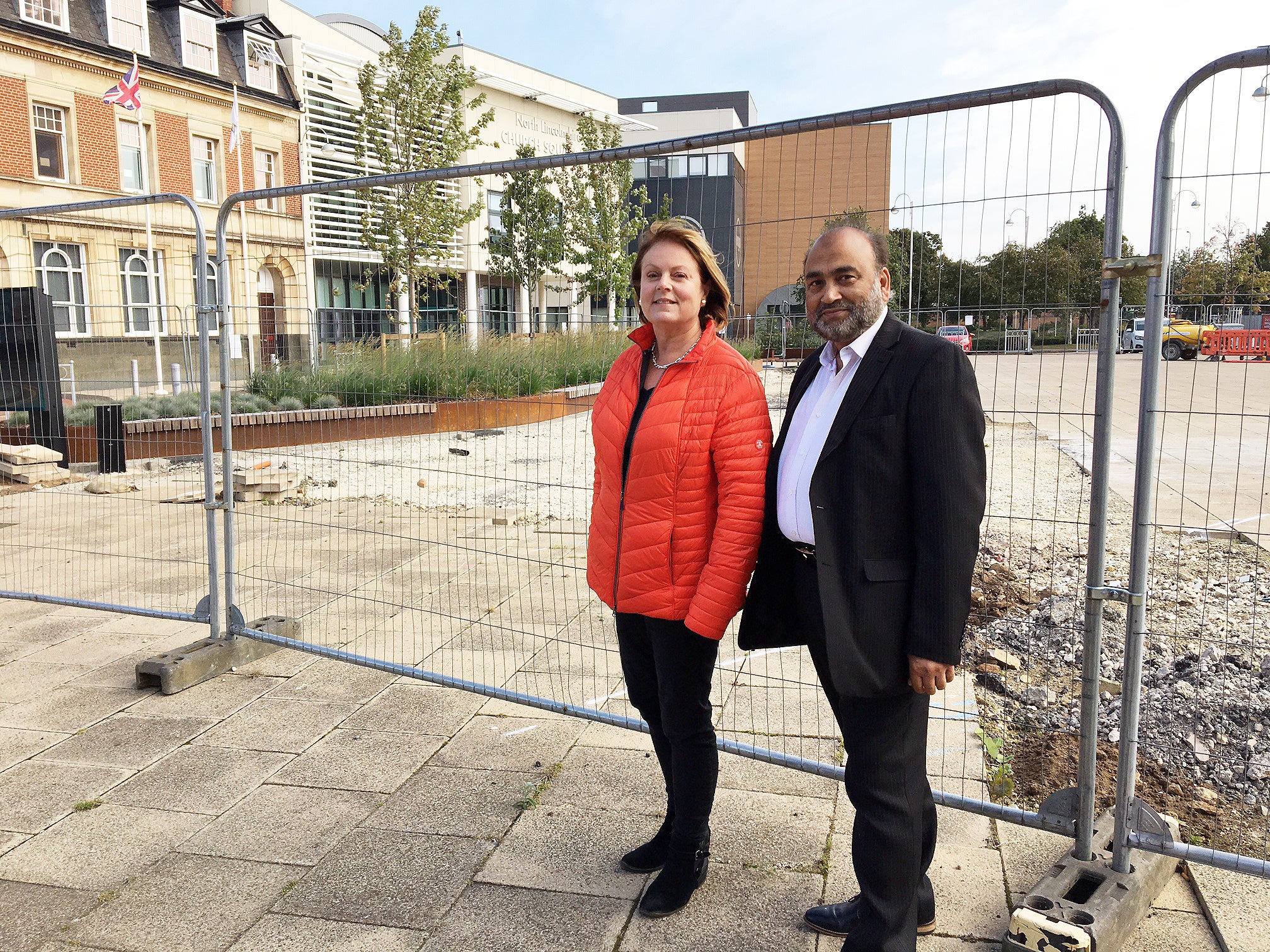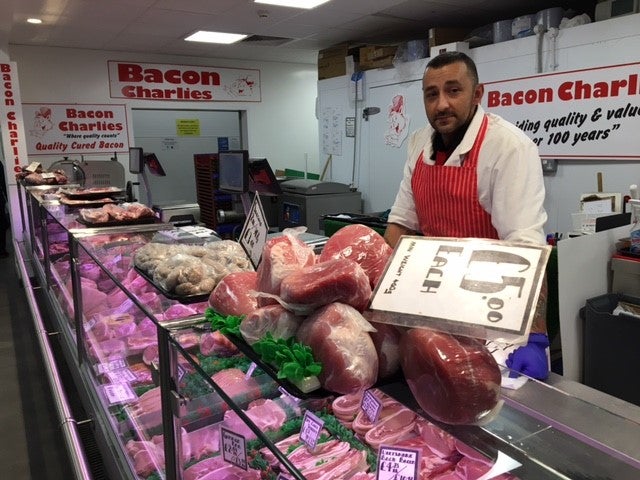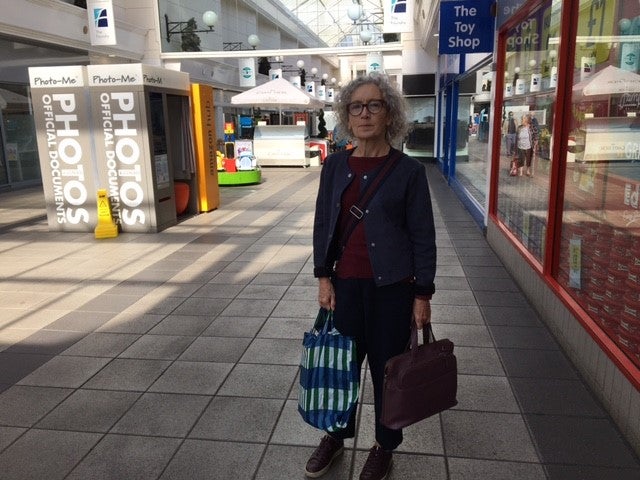‘Are the new paving stones it?’: Red wall waits for levelling up it fears will never come
Millions have been spent on small-scale beautifying of northern towns but, ahead of a government white paper on its flagship agenda, voters in Scunthorpe wonder if anything will really change. Colin Drury reports

Your support helps us to tell the story
From reproductive rights to climate change to Big Tech, The Independent is on the ground when the story is developing. Whether it's investigating the financials of Elon Musk's pro-Trump PAC or producing our latest documentary, 'The A Word', which shines a light on the American women fighting for reproductive rights, we know how important it is to parse out the facts from the messaging.
At such a critical moment in US history, we need reporters on the ground. Your donation allows us to keep sending journalists to speak to both sides of the story.
The Independent is trusted by Americans across the entire political spectrum. And unlike many other quality news outlets, we choose not to lock Americans out of our reporting and analysis with paywalls. We believe quality journalism should be available to everyone, paid for by those who can afford it.
Your support makes all the difference.It is the government’s flagship agenda, an oft-repeated promise to revive and regenerate communities that have long felt left behind.
In Scunthorpe, however, levelling up currently appears to mean, er, paving stones.
The Lincolnshire town of 83,000 people is exactly the kind of place ministers tend to have in mind when they talk of the need for rejuvenation: decimated by deindustrialisation in the Eighties, smashed by austerity over the last decade and, most recently, hammered by Covid-19.
Yet, almost two years after Boris Johnson first vowed to level up the country, the only sign of action here in Scunthorpe is £1m being lavished on reflagging the square outside the local council offices.
The Conservative-run authority says this government-funded beautifying – planters have been installed too – creates a more pleasant town centre which, in turn, will increase footfall and investment.
But not everyone is convinced. “A total waste of money,” says Councillor Lorraine Yeadon, a Labour member surveying the ongoing work today. “All the things that Scunthorpe needs and they spend a million pound on that? Tell me how that will help level anything up?”
In towns and cities across the old red wall, similar questions are beginning to be asked.
With the government promising to finally publish its Levelling Up white paper this autumn – and Michael Gove appointed minister for the concept in the recent reshuffle – there is a growing disquiet among northern voters that no one, including the prime minister himself, appears to know what the term actually means or how it can be delivered.
And a new poll this weekend, on the eve of the Conservative Party conference in Manchester, shows that the majority of people think the government has failed to deliver on the flagship policy.
While disparate pots of money have been made available for high street facelifts and minor infrastructure upgrading, an overall strategy appears missing in action. Levelling up remains, as one Tory backbencher put it, a slogan designed to “mean all things to all people”.
So, what, in fact, does it mean to communities, like Scunthorpe, at the sharp end? And, if this white paper is to become, as some are suggesting, a defining moment in the Johnson premiership, then what do the voters here believe should be in it?

‘Common man feeling the pinch’
Scunthorpe is known as England’s industrial garden town because of its mix of greenery and heavy works. It is almost certainly the only place in the country with a leisure centre modelled on the Eden Project domes. Yet, despite these unique claims to fame, it has much in common with many similar sized towns across the midlands and the north.
Though the town was once thriving and prosperous, the last half-century has not been kind. Deindustrialisation saw its steelworks go from employing 25,700 people in the Sixties to just 4,000 people today. “There wasn’t a family here who wasn’t affected in some way,” says Councillor Mashook Ali, whose own father worked in the vast plants.
The high street, too, is a shadow of what it once was. Empty units are everywhere. On the walk from the train station to the town centre, evidence of decline marks every turn: a derelict hotel, closed-down court buildings, most markedly of all, perhaps, the old HMRC office, a sprawling three-storey landmark that has stood abandoned for more than a decade now.
“We used to have shops and nightlife and a buzz about the place,” says Ali, who runs Crosby Cabz in the town. “Now, there’s almost nothing to keep people here.”
Perhaps on the back of all this – as well as a desire to get Brexit done – the town voted for its first Tory MP for a generation in 2019. Holly Mumby-Croft is the granddaughter of a Scunthorpe steelworker and appears well thought of here (she did not return The Independent’s request for interview). Yet, in common with many of her blue colleagues in former Labour seats, her re-election next time round may well depend on how levelling up goes.
So Leon Taylor, butcher and trader in the town’s St John’s Market (opened in 2019), how is it going?
“Has it started yet?” the 35-year-old asks in a deadpan tone.
There’s the new paving stones? “Is that it?” he asks. “Funny how that’s getting done outside the council offices, isn’t it? Lovely for them.”
The father-of-three is keen to make one point in particular. “They keep talking about this levelling up but then national insurance is going up, gas prices are going up, the cost of living is going up,” he says. “The common man is feeling the pinch. Feels more like levelling down to me.”
Time and again speaking to people here, three main issues are raised: lack of good jobs, lack of educational opportunities and lack of town centre shops. “It’s so bad,” one pensioner notes, “I’ve started going over to Grimsby.”
They keep talking about this levelling up but then national insurance is going up, gas prices are going up, the cost of living is going up. The common man is feeling the pinch. Feels more like levelling down to me
For Jill Harrison, a 63-year-old educational manager who lives in town, this is key.
“We need to modernise,” she says. “There’s nowhere nice to eat, no nice coffee shops, no real independent stores. There’s lots of people like me...I want to come in to town but there’s nothing to come for… so you go out of town and your money goes with you.”
How could the government or council help resolve that? Accept, she says, that major chains are increasingly uninterested in small towns and create an environment where small shops can flourish once more. “Let’s have something unique here,” the grandmother-of-three says. “That you can’t get in Sheffield or Nottingham or Lincoln.”
Other issues raised on the alter of levelling up? Better pay for carers, greater funding for the local hospital, more trains, and investment in youth clubs. When Yeadon ponders how a million pounds might have been better spent than on paving stones, she even raises new play equipment for deprived areas.
All of which may hint at part of the conundrum now faced by the prime minister. That is to say, if levelling up was a slogan deliberately designed to mean all things to all people, it really does seem to have worked. Unless all things to all people can now be delivered, huge swathes of voters may well be left feeling somewhat let down.

‘We need a load of money’
For his part, Rob Waltham appears to understand the challenge – but reckons good progress is, in fact, already being made.
He too is the son of a steelworker. He is also the Tory leader of North Lincolnshire Council.
Speaking to The Independent, he reels off a range of government grants he says have already been secured for the town. Among them is £10m to help build 40-bedroom student accommodation where the old market once stood, £11m for junction improvements on the M181 and – lest we forget – that £1m for Church Square. Another £116m worth of bids are currently being processed by Whitehall. If approved, they would see improvements to internet infrastructure and a new health centre among other schemes.
“We do need a load of money,” says Waltham, who has led the council since 2017. “But that’s what we’re having. You can’t dispute that. Levelling up just means that there are other areas of the country that have got higher wages, and better prospects and opportunities. But, by having this money, it is enabling us to do things we would never have been able to do.
“I’ll give you an example. We’re now looking to open up a brand-new advanced manufacturing park to bring technical skills and better paid jobs to our area but, if we hadn’t had access to these grants, that would never be happening.”
Yet he bristles at the suggestion there is no coordinated plan; that having different towns bid off against each other creates competition between exactly those areas that need help most.
“The trouble is no one will invest a penny [in struggling towns] if all we have is people pushing a negative tone,” he says. “You wouldn’t buy a house or a car or even a bun in a baker’s shop if you’d heard someone repeatedly saying how bad it was… So let’s not keep talking the north down. We are seeing real opportunities now. Let’s talk that up and get businesses investing here too.”
Subscribe to Independent Premium to bookmark this article
Want to bookmark your favourite articles and stories to read or reference later? Start your Independent Premium subscription today.

Join our commenting forum
Join thought-provoking conversations, follow other Independent readers and see their replies
Comments